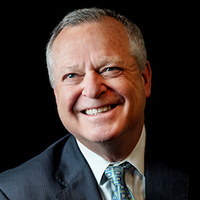
HFMA CEO and President Joseph J. Fifer, FHFMA, CPA
We just marked the Fourth of July, a celebration of our freedom. But this year, the freedom we have looks a little different. Or it should.
I am neither a bandwagon jumper nor an apologist. My “hard truths” interview in the January issue of hfm and the follow-up industry call-to-action column proved that. But like many of you, I presume, I have been troubled these last few weeks. By the senseless, unnecessary death of George Floyd. By protests. Riots. More senseless deaths. But I did not say much about it. Honestly, and this was my mistake: I figured (a) I do not perceive myself as a racist, and (b) I have enough on my plate, what with COVID-19 issues coming on top of an already challenging healthcare environment. I figured this is someone else’s problem to solve because I have my own. And that attitude is why collectively, as a society, we have allowed racism to exist and to continue. But the irony of the Fourth of July celebration of our freedom juxtaposed with what I am learning about racism inspired me to speak out to all of you. I struggled with the issue of whether to speak out. What would be the purpose of making a statement to you, our HFMA members?
Three items I read changed my mind, including:
- A letter from a group of Black physicians detailing numerous examples of racist behavior they had experienced in a health system
- A compelling Wall Street Journal article
- A message from (of all places) the owner of the CrossFit gym in Scottsdale, Arizona, disavowing racist remarks by the chain’s founding CEO (before the CEO stepped down)
Yet I was still uncertain about whether to speak out.
Then my wife, Katie, said to me, “Does silence mean you support white supremacy?” That was the last impression I wanted to leave. So, I did some more reading. I called, texted and emailed friends, staff and acquaintances. The upshot of it all — I cannot remain silent any longer.
I thought of my hard truths interview and, interestingly, drew some parallels. Like many healthcare policy issues, racism is a deeply entrenched problem. It’s sometimes blatant, but often subtle, and seldom acknowledged. Micro inequities abound. Things like crossing the street so as not to walk by a young Black man. Or saying, “All lives matter,” which is probably equivalent to saying, “Keep the status quo.”
Then there are the more overt displays of racism. Jobs for which one is not considered. Comments made during job interviews. The prejudices of the parents — of all races — being passed down to their children and expressed through social exclusion. And finally, the realization that decades after the racial upheaval in the 60s, racism is still deeply rooted in our society. I did not want to admit that to myself. I did not want to think that racism is still a huge problem for our society and even if it was, it was someone else’s problem to solve.
But I also thought about the police, including officers I know personally. Just a few weeks ago, we were hailing the COVID-19 first responders as heroes. Now, some are disparaging police and saying that governments should defund them. The reality is there are millions of good, honest, selfless police officers but now all of them are under attack.
My son said it best in his sermon a few weeks ago: Protests and riots are like a fever: It indicates something is wrong. And it is safe to say, after all these years of laws, regulations and program funding, something is wrong. The uproar over these last few weeks is the fever; racism is the sickness.
This issue is huge. And it’s something none of us can fix, individually. That is similar to healthcare. But I cannot sit idly by and let this all go, just like I cannot let healthcare problems continue unabated without my comments. I am tired of the hate, the riots and bad cops giving a bad name to what I have always believed to be a venerable profession. I am tired of media shaping the narrative and people sticking their heads in the sand.
I do know this: Racism is wrong. It’s rampant. It’s often silent. It’s destructive.
And it needs to stop. It’s time to recognize all forms of racism. It’s time to start talking about it. I want to start a dialog about racism within HFMA. We will convene groups to talk openly about racism and learn about micro inequities. And here’s what I’m asking healthcare finance professionals to do.
- Stop… whatever you think about racism and all the surrounding issues, just pause those thoughts for a moment.
- Listen… with curiosity and empathy. Learn what everyday racism feels like.
- Care… about the impact of racism on our society and our healthcare industry.
We need to do our part to improve diversity and inclusion within our organizations. Learn about your organization’s efforts and how you can contribute. The finance field, including healthcare finance, has a long way to go in this arena.
We cannot fix our whole society, just like we cannot fix all that ails healthcare. But that doesn’t stop us from trying to improve healthcare and it is not going to stop us from taking a stand on racism. Staying silent about racism is just not acceptable anymore. As it is with healthcare, so it is with the fight against racism: Now is the time to help shape a better future. And it starts within each of us.





